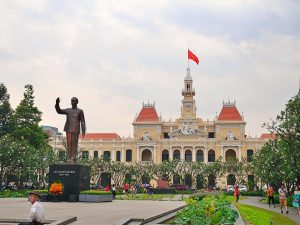In the realm of business initiation, the primary steps involve the processes of recruitment and employment. These initial stages often pose considerable challenges for newly established enterprises, particularly when they lack familiarity with the local language, populace, customs, and legal framework. In this article, we will endeavor to elucidate the practices related to employment in Vietnam, approaching the topic from both a legal and pragmatic standpoint. This post is tailored to assist those looking to setup an offshore company in Vietnam.
Employment & Labor Laws in Vietnam
Employment contracts in Vietnam
When bringing new team members on board, it’s essential to adhere to Vietnamese legal requirements. Vietnamese law mandates that employers must create written employment contracts for their employees. These contracts should be straightforward yet firm in language, clearly defining an employee’s compensation, benefits, job duties, and termination provisions.
Additionally, it’s crucial to ensure that both employment contracts and offer letters are presented in both Vietnamese and English. When specifying salary and benefits, it’s necessary to use Vietnamese dong (VND) as the currency, as opposed to a foreign one. If you require assistance with crafting robust employment contracts that align with local regulations, our team of local experts is here to provide support.
Working hours in Vietnam
In Vietnam, the standard working hours for employees typically amount to a maximum of eight hours per day and 48 hours per week. Employers are legally obligated to grant their employees at least one day off per week, commonly designated as Sundays. A typical workweek in Vietnam runs from Monday through Friday (some companies require the employees to work additionally in the Saturday morning), consisting of eight hours per day.
Public Holidays in Vietnam
Vietnam observes several public holidays each year, including the week-long celebration of Tet Lunar New Year. On National Day, international employees working in Vietnam are entitled to a paid day off.
- New Year (1 day)
- Lunar New Year (5-7 days)
- Unification Day (1 day)
- Labor Day (1 day)
- Hung King’s day (1 day)
- Independence day (2 days)
Vietnam Employer taxes and duties
The applicability of Statutory Social Insurance in Vietnam depends on whether employees are hired under indefinite-term labor contracts or fixed-term labor contracts that extend beyond three months. Vietnam’s social insurance fund offers allowances for:
- Maternity leave
- Sick leave
- Occupational disease
- Work-related accidents
- Pensions
A mandatory social, health, and unemployment insurance scheme is also in place in Vietnam. Both employees and employers are required to contribute to this scheme, with contributions calculated based on the employee’s monthly salary as stipulated in the labor contract. These contributions are capped at 20 times the Common Minimum Wage for SI/HI and 20 times the Minimum Regional Wage for UI.
Mandatory unemployment insurance is only applicable to enterprises with 10 or more employees.
- Local: Employers contribute 21.5% of payroll to social insurance; local employees contribute 10.5%
- Expat: Employers contribute 6.5% of payroll to social insurance; ex-pat employees contribute 1.5%
- Union Fee: 1% if the company establishes a Union, 2% if not.
- Trade Union: 2% (compulsory to the employer).
Employee’ health benefits in Vietnam
Health insurance for employees is a legal requirement in Vietnam. Employers must provide this coverage to their employees and ensure they receive annual health check-ups.
Annual leave in Vietnam
Vietnamese labor law specifies that employees are entitled to 12 days of annual leave. The conditions for leave are as follows:
- Workers who have accumulated a minimum of 12 months of working with their employer are eligible for 12 days of paid annual leave. Conversely, employees with less than 12 months of service with the company are entitled to a proportionate amount of leave.
- An additional paid vacation day is granted for every five years of company service.
- If employees do not utilize their accrued annual leave by the end of a year, they have the right to receive compensation in lieu of taking the leave. Typically, employers do permit employees to carry over any unused annual leave to the subsequent year, but this carryover period usually extends no later than March 31st of the following year. This option serves as an alternative to receiving payment for unused leave.
- In addition, as an extra benefit, employees engaged in hazardous work conditions have the opportunity to negotiate for additional leave, a matter settled through discussions between the employee and employer.
- In Vietnam, it’s important to note that vacation leave is distinct from sick leave or maternity leave.
Furthermore, employees in Vietnam have the privilege of taking paid personal leave for their own wedding or the wedding of their child. Moreover, both paid and unpaid personal leave options are typically available to employees in the unfortunate event of the death of a parent, spouse, or child.
Sick Leave in Vietnam
Employees facing illness or injury may qualify for an allowance, the funding for which is provided by Vietnam’s social insurance fund. To secure this allowance, employees must submit the necessary medical documentation as evidence of their need for leave.
In Vietnam, sick leave allowance is determined by an employee’s salary, which is subsequently utilized in the calculation of the social insurance premium. The maximum entitlement for sick leave allowance is:
- 30 days per year if the employee has contributed to the social insurance fund for less than 15 years.
- 40 days per year if the employee has contributed to the social insurance fund for a period between 15 and 30 years.
- 60 days per year if the employee has contributed to the social insurance fund for more than 30 years.
Maternity and Paternity leave in Vietnam
In Vietnam, female employees are entitled to a six-month paid maternity leave at their full salary, which corresponds to the base salary for social insurance contributions. The expenses for this maternity leave are covered by mandatory social insurance.
Under Vietnamese labor law, a female employee who is pregnant, on maternity leave, or has a child younger than 12 months of age can only be terminated if her employer ceases operations. In these circumstances, no other grounds for dismissal are permitted.
It’s important to note that employers in Vietnam are not obligated to directly pay the salary of an employee on maternity leave. However, the length of the maternity leave is determined based on the employee’s salary and is used to calculate the social insurance premium. The maximum entitlement for maternity leave stands at VND 29,800,000.
For fathers in Vietnam, there is a provision for paid paternity leave, which spans between five to 14 days. The duration of paternity leave depends on factors such as the method of childbirth (natural or caesarean) and whether it’s a single or multiple births.
Termination and Severance in Vietnam
In Vietnam, an employee’s rights in the event of termination hinge on their employment agreement and the cause for dismissal, which influences notice periods and potential severance payments.
In the context of hiring new employees in Vietnam, it’s customary for employers to establish a probationary period. For roles requiring specialized or highly technical skills, probation periods should not exceed 60 days, while for other positions, the probation period should not exceed 30 days.
Employers have the authority to terminate fixed-term labor contracts after providing a notice period of 30 working days. In the case of indefinite-term labor contracts, a 45 working day’s notice is required. In both scenarios, the employer must have valid legal reasons for the termination, such as performance issues, extended illness, force majeure events, or the dissolution of the company.
Importantly, an termination could be deemed unlawful if the employer cannot show valid reasons or fails to adhere to statutory procedures. In such cases, the employer may be obliged to reinstate the employee and/or compensate them for the period during which they were unable to work. Additionally, a penalty equal to two months of the employee’s salary may be imposed on the employer for wrongful termination.
Typically, settlements and voluntary resignations can be negotiated, often accompanied by an agreed-upon severance package for the departing employee. Managing employee terminations and navigating the complexities of severance packages can be challenging, particularly for offshore company established in Vietnam. New Horizons’ Vietnam PEO services are designed to help offshore companies mitigate risks and provide expert guidance throughout this process.
Vietnam compensation and benefits – Practice and culture
Vietnam minimum wages
In Vietnam, minimum wage regulations are contingent on the specific geographical area where a business operates. This practice stems from the need to calibrate wages in consideration of factors such as cost of living and the socioeconomic conditions affecting workers and their families within each region.
In terms of specifics, major urban centers in Vietnam typically impose the highest minimum wage, set at VND 4,800,000 per month. Conversely, rural areas generally have a lower minimum wage, typically at VND 3,070,000 per month. It’s worth noting that minimum wages can experience fluctuations as the economy progresses. However, it’s important to emphasize that in practice, only a minority of companies adhere strictly to these minimum wage levels. In reality, these minimum wage rates are primarily used as a basis for calculating the capped state insurance contributions and do not hold significant practical relevance when designing an attractive compensation and benefits (C&B) policy in Vietnam.
| Minimum Wage Country Comparison Chart | (Per month in USD) |
|---|---|
| Switzerland (Geneva) | $4,000 |
| Italy | $2,255 |
| China | $308 |
| Vietnam | $126 |
| Uzbekistan | $22 |
Compulsory benefits for employees in Vietnam
Employers must remain vigilant regarding compliance with all statutory benefits mandated by Vietnamese law, encompassing time off for both holidays and vacations.
In Vietnam, employees are entitled to time off during public holidays, with the Tet Lunar New Year being a noteworthy example as it extends for a full week, affording employees a week-long break.
It is important to distinguish between Vietnam’s public holidays and the country’s minimum vacation entitlements. Vacation leave is contingent on the duration of an employee’s tenure with a company. For instance, employees with 12 months of service are entitled to 12 days of paid annual leave. Additionally, employees gain an extra paid vacation day for every five years of service with the company.
Non-compulsory benefits for employees in Vietnam
Employers in Vietnam should also give careful consideration to offering supplementary benefits to their employees, as these can have a significant impact on employee retention rates. While these additional benefits are not mandatory, many employees expect them as part of their overall compensation package.
Furthermore, it’s common practice in Vietnam for employers to provide a 13-month bonus to employees who have completed a year of service. This bonus typically amounts to one month’s salary but can vary and is usually disbursed before the Lunar New Year Holiday.
Despite Vietnam providing standard health insurance through its national system, many employers opt to offer their employees supplementary health and life insurance coverage. Alternatively, some companies provide an insurance allowance to their employees.
Challenges and obstacles in providing benefits to your employees in Vietnam
Generally, one of the primary challenges for expanding businesses in terms of benefits and compensation is the requirement to establish a local entity. In Vietnam, employers are typically prohibited from hiring and compensating employees until they have successfully set up a subsidiary, a process that can consume several months and disrupt business operations significantly.
Fortunately, our Employer of Record and Payroll services offer a solution that enables businesses to commence operations in Vietnam without delay. We assume the role of your employees’ Employer of Record, eliminating the need for you to establish a subsidiary in Vietnam. Moreover, we can facilitate the sourcing, hiring, and onboarding of top local and international talent through a combined Employer of Record & Payroll service, utilizing our in-house recruitment team. This streamlined approach ensures a swift and efficient entry of offshore businesses into the Vietnamese market.
Contact us for more information.







